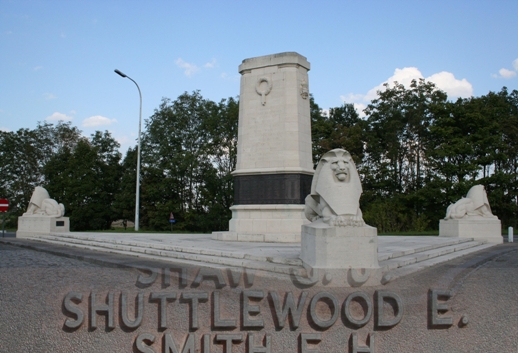The Shuttlewood Brothers
Both George and Ernest were sons of George and Jessie Shuttlewood of the Gore, Rayne.
In the 1911 census the Shuttlewood family are
living at Wales Cottages, Dunmow Road , Felstead. These cottages are still
in existence although reduced to two dwellings. They are opposite Kings Tree
Nursery. The entry shows the following information:-
Jessie Shuttlewood Head Widow 51 Domestic duties at home born at Tilty
George son single 20 Labourer with threshing machinery born at Dunmow
John son single 17 Farm Labourer born at Felstead
Hilda 14
Dorothy 12
William 11
Ashley 6. The younger siblings all listed as at school and all born in
Stebbing.
Ernest is shown as living in Newport Essex and working as a grocer's
assistant.
Ernest Shuttlewood
 Ernest Shuttlewood served as a Private soldier with the
11th Battalion the Border Regiment. He died age 30 on 10th July 1917.
Ernest Shuttlewood served as a Private soldier with the
11th Battalion the Border Regiment. He died age 30 on 10th July 1917.
Having no known grave he is
remembered at the Nieuport Memorial. (Photographs courtesy
www.britishwargraves.co.uk)
Born in Easton, near Great Dunmow. He enlisted at Saffron Walden.
Private Shuttlewood was serving with the Border Regiment near Nieuport on the Belgian Coast. This was the extreme end of the Western Front, which stretched from the Belgian coast to the borders of Switzerland. This had been a relatively quiet sector of the front but on 20th June 1917, XV Corps relieved the French Forces on a 6 kilometer front from the Belgian Coast to a point south of Nieuport. The British immediately began improving the defences, but the German Army observing the works expected an assault and decided to make a pre-emptive strike which has become known as the Battle of the Dunes at Nieuport Bains.
On the 6th July the Germans launched a 3 day artillery bombardment. At 5.30 am on 10th July the intensity of the bombardment intensified, and mustard gas was used for the first time in the barrage. The battalion war diary shows that communications were destroyed and casualties steadily increased. Indeed by the end of the Battle of the Dunes hundreds of men had been killed.
George H. Shuttlewood
George Shuttlewood served as a Private soldier with the
2nd/7th Battalion the Essex Regiment.
He died age 24 on 29th April 1916. He is buried at Thetford Cemetery.
George Shuttlewood, was a member of the 2nd/7th Essex Regiment, this was a territorial battalion, which provided training and recruits for the active service battalions. In spring 1916 it was stationed at Thetford in Norfolk. The records at the Essex Regiment Museum show that George was never given an entitlement to any war medals so we know he did not make it to the front.
His death certificate shows that George died of Cerebro Spinal Meningitis, and that within 12 hours a bacteriological post mortem had been carried out to test the Cerebro Spinal fluid. The post mortem being certified by John E. B. Wells MRCS.
The certificate also reports that the death was reported by Captain F.H. Hall, who also organised the burial at the 2/7 Essex Camp, Thetford.
The certificate also gives us an interesting detail about George as it records his occupation as "Private 2/7 Essex Regiment (Steam wagon driver)". As the Essex regiment did not have steam wagons this would have been George's civilian occupation.